Magic Mushroom Gummies: Unlocking Emotional Resilience with Customer Guarantee
Magic Mushroom Gummies represent a modern, discrete method for exploring psilocybin's therapeut…….
In the evolving landscape of mental health and wellness, a unique and increasingly popular approach is gaining traction: magic mushroom gummies. These edible psychedelics, derived from the active compounds found in certain types of mushrooms, are being explored for their potential to enhance emotional resilience and overall well-being. This article delves into the world of magic mushroom gummies, examining its definition, global impact, economic implications, technological advancements, regulatory landscape, challenges, case studies, and future prospects. By exploring these facets, we aim to provide a comprehensive understanding of this burgeoning field and its promise for transforming mental health care.
Magic mushroom gummies are edible supplements or candies infused with psychotropic compounds primarily found in species of the Psilocybe genus. These mushrooms contain psilocybin, a compound that breaks down into psilocin in the body, leading to altered consciousness and potential therapeutic effects. When consumed, magic mushroom gummies aim to induce a state of heightened awareness, introspection, and emotional processing, often referred to as a “psychedelic experience.”
The use of psychedelic compounds for spiritual and medicinal purposes dates back centuries in various cultures worldwide. However, modern interest in magic mushrooms and their potential therapeutic applications gained momentum in the late 20th century. Researchers and advocates pushed for further exploration after early studies suggested that psilocybin could have positive effects on mental health conditions like depression, anxiety, and post-traumatic stress disorder (PTSD).
Today, magic mushroom gummies represent a innovative approach to mental health care, offering a non-invasive, easily accessible method of delivering psychedelic therapy. They are part of a broader movement towards integrating psychedelics into mainstream wellness practices, leveraging their potential to enhance emotional resilience—the capacity to bounce back from adversity and navigate life’s challenges with adaptability and strength.
The concept of emotional resilience is not limited to any specific region or culture but is recognized as a vital component of overall well-being across the globe. As such, the global impact of magic mushroom gummies extends beyond borders. Here are some key trends shaping this field:
North America and Europe: These regions have been at the forefront of psychedelic research and therapeutic applications. Countries like the United States, Canada, and several European nations have witnessed a surge in interest in magic mushrooms for mental health purposes, leading to increased legal accessibility and clinical trials.
South America: Countries like Peru, known for its traditional use of psychedelic plants, are now attracting international attention for their therapeutic potential. Legal loopholes and cultural acceptance have facilitated research and personal exploration, contributing to the global conversation on psychedelics.
Asia and Oceania: Australia and certain Asian countries are also experiencing a growing interest in magic mushrooms. Regulatory changes and increasing awareness of alternative wellness practices are driving this trend.
In each region, emotional resilience is a shared focus, but cultural nuances shape how these psychedelic compounds are perceived and integrated into healthcare systems.
The global impact of magic mushroom gummies is multifaceted and dynamic, with trends varying across regions:
| Region | Key Trends | Regulatory Status | Cultural Context |
|---|---|---|---|
| North America | Increasing legal accessibility, clinical trials for mental health treatments, rise of psychedelic-assisted therapy centers | Diverse; some states in the US have legalized psilocybin for medical use | Strong interest in alternative wellness practices, growing acceptance of psychedelics among millennials and Gen Z |
| Europe | Growing research on psilocybin’s therapeutic benefits, increasing legal availability in certain countries like the Netherlands | Varied; some countries allow limited medical use, while others have stricter regulations | Similar to North America, with a growing psychedelic subculture |
| South America | Emerging as a hub for psychedelic research, traditional cultural practices influencing modern interest | Legal loopholes and varying regional laws make it challenging to regulate | Longstanding cultural acceptance of psychedelics for spiritual and medicinal purposes |
| Asia & Oceania | Increasing awareness of psychedelic tourism, regulatory changes in Australia | Mostly illegal but with some countries considering therapeutic use | Cultural openness to alternative healing methods, growing interest in mindfulness and wellness |
These trends highlight the diverse global landscape surrounding magic mushroom gummies, where cultural acceptance, legal frameworks, and evolving scientific understanding interplay.
The economic aspects of the magic mushroom gummies market are complex and multifaceted. Here’s a breakdown:
Production: The production of magic mushroom gummies involves specialized cultivation techniques for growing psilocybin-rich mushrooms and extraction processes to create edible forms. This sector is largely based in small-scale operations, with some larger companies emerging in regions where production is legal.
Distribution and Sales: Distribution channels vary from online retailers to specialty stores, apothecaries, and even some mainstream supermarkets. Legal accessibility plays a significant role in market growth, with countries like the US and Canada leading the way.
Pricing: Pricing varies widely based on product quality, potency, brand reputation, and region. High-quality gummies can range from $20 to $100 per serving, making them accessible to various income levels.
The economic implications are significant:
Job Creation: The industry supports a range of jobs, from mushroom cultivators and chemists to healthcare professionals and retail staff.
Revenue Generation: Global revenue estimates for the psychedelic market, including magic mushroom gummies, suggest substantial growth potential. Market research indicates a compound annual growth rate (CAGR) of over 20% in the next five years.
Tax Revenue: Legalization and regulation could lead to substantial tax revenues for governments, contributing to healthcare and social programs.
The market’s growth presents investment opportunities across various sectors:
Agriculture and Biotechnology: Investing in sustainable mushroom cultivation practices and biotechnology advancements can drive production efficiency.
Healthcare Services: Psychedelic-assisted therapy centers offer a growing need for specialized healthcare professionals and services.
Retail and E-commerce: The online sales channel presents opportunities for retailers specializing in health and wellness products.
Technological innovations are transforming the way magic mushroom gummies are produced, consumed, and studied:
Cultivation Techniques: Advanced cultivation methods enable consistent production of high-quality mushrooms with controlled psilocybin levels, ensuring product safety and efficacy.
Edible Formulations: Research into various edible forms, from gummies to capsules, allows for precise dosing and easier consumer administration.
Psychoactive Delivery Systems: Emerging technologies explore alternative delivery methods, such as nasal sprays or transdermal patches, offering potential benefits in terms of bioavailability and user experience.
Digital Therapeutic Platforms: Smartphone apps and online platforms facilitate psychedelic-assisted therapy sessions, making therapeutic support more accessible and affordable.
The regulatory environment surrounding magic mushroom gummies is complex and varies widely globally:
Legal Status: In most countries, magic mushrooms are classified as Schedule I or II controlled substances, prohibiting their use except for limited research purposes. However, a growing number of jurisdictions are reevaluating these laws.
Research and Clinical Trials: Strict regulations govern the conduct of clinical trials involving psychedelics to ensure participant safety and data integrity. Several countries have approved such trials, leading to valuable research on psilocybin’s therapeutic potential.
Decriminalization and Legal Access: Some jurisdictions have decriminalized magic mushrooms for personal use or implemented legal access programs for medical purposes. Examples include Amsterdam (Netherlands), Portland (Oregon, US), and several Canadian provinces.
International Cooperation: Global organizations like the United Nations and World Health Organization (WHO) are working to harmonize regulatory approaches, foster research collaboration, and address public health concerns.
Despite growing interest and potential benefits, magic mushroom gummies face several challenges:
Safety Concerns: Ensuring product safety is critical due to the unregulated nature of the market. Proper cultivation, testing, and quality control are essential to minimize risks.
Misuse and Abuse: Like any potent substance, magic mushrooms carry a risk of misuse, especially in unsupervised settings. Educating consumers about responsible use is crucial.
Legal and Regulatory Hurdles: Navigating complex legal landscapes presents challenges for businesses and researchers. Unclear regulations hinder access to treatment and limit research opportunities.
Stigma and Public Perception: Stigma surrounding psychedelics can deter people from exploring their potential therapeutic benefits, emphasizing the need for ongoing public education and awareness campaigns.
A pilot study in the US (2016) explored the effects of psilocybin-assisted therapy on major depressive disorder. Participants reported significant reductions in depression symptoms, with effects sustained for up to six months post-treatment. Another study (2018) showed similar results for anxiety disorders, with participants experiencing reduced anxiety and improved quality of life.
Research has indicated that magic mushroom-assisted therapy can help individuals struggling with PTSD process traumatic memories and reduce symptom severity. A 2019 study found that psilocybin treatment led to significant improvements in PTSD symptoms, offering a promising alternative to traditional treatments for this condition.
Psilocybin has shown potential in treating substance use disorders by addressing underlying psychological issues. Case studies have reported successful outcomes in helping individuals overcome alcohol and nicotine addiction by facilitating deeper personal insights and emotional healing.
The future of magic mushroom gummies appears promising, with several key developments on the horizon:
Increasing Scientific Evidence: Ongoing clinical trials and research will further validate psilocybin’s therapeutic potential, providing a stronger evidence base for its use in healthcare settings.
Improved Access to Treatment: As more countries legalize or decriminalize magic mushrooms, access to psychedelic-assisted therapy will expand, benefiting individuals seeking mental health support.
Integration into Healthcare Systems: Psychedelic medicine may become an integral part of mainstream healthcare, with insurance coverage and integrated treatment protocols becoming more common.
Global Collaboration: International cooperation in research, regulation, and policy development will help establish best practices and ensure a consistent approach to psychedelic therapy worldwide.
Advancements in Delivery Methods: Innovations in delivery systems will make psilocybin therapy more accessible, convenient, and appealing to diverse consumer preferences.
In conclusion, magic mushroom gummies represent a rapidly evolving field with significant potential to revolutionize mental health treatment. As research continues to uncover their therapeutic benefits, regulatory environments adapt, and public understanding grows, these ancient compounds may find new life in modern healthcare practices.
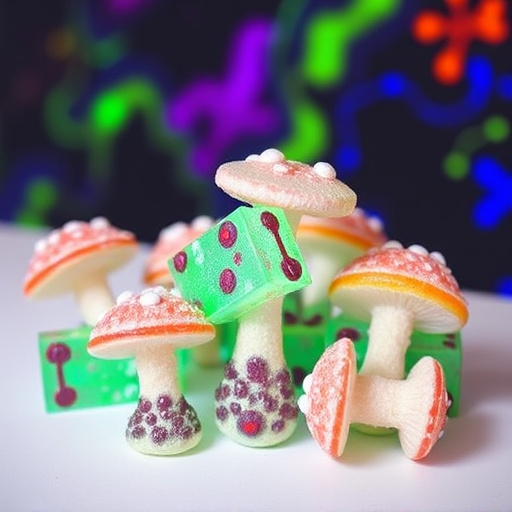
The rise of Magic Mushroom Gummies has revolutionized alternative wellness, offering a safe, legal,…….
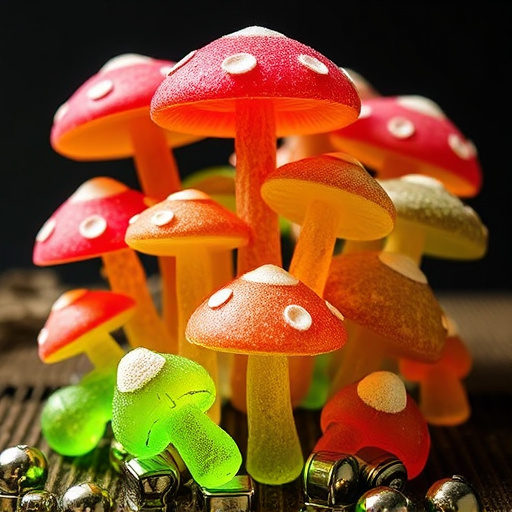
Magic Mushroom Gummies are transforming mental health support by providing a safe, low-dose way to a…….
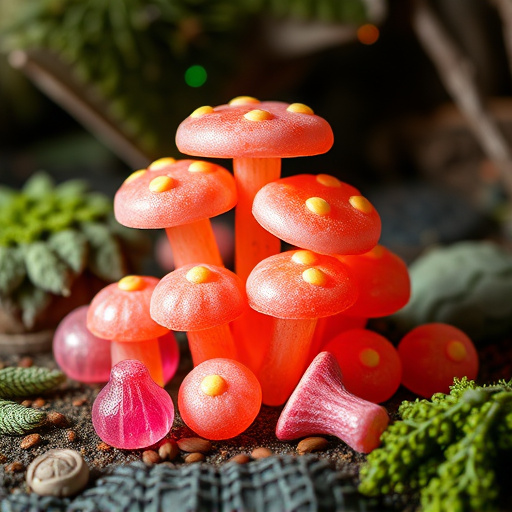
Magic Mushroom Gummies offer a personalized approach to emotional health with varieties tailored to…….
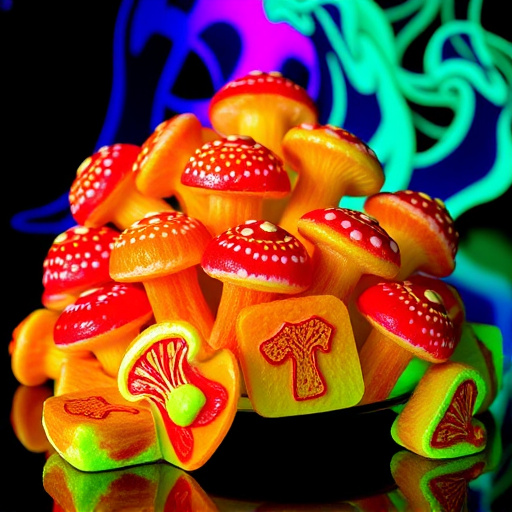
Magic Mushroom Gummies derived from Psilocybe cubensis offer a novel way to boost emotional resilien…….
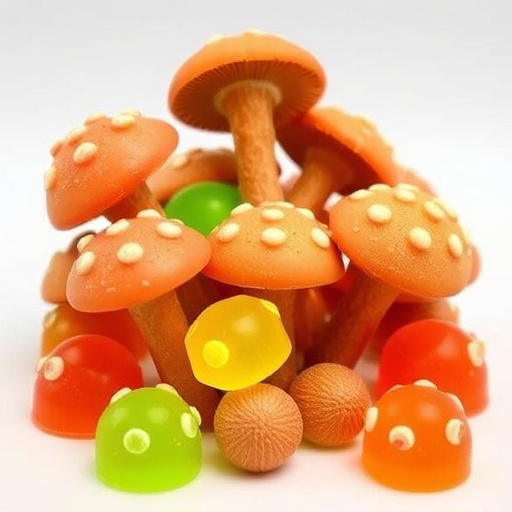
Magic mushroom gummies, enriched with psilocybin, are gaining popularity as a novel therapy for enha…….
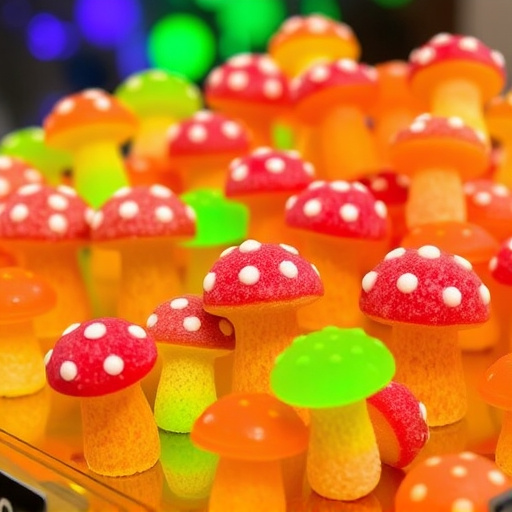
Magic Mushroom Gummies, through microdosing psilocybin, offer a novel and accessible way to boost em…….
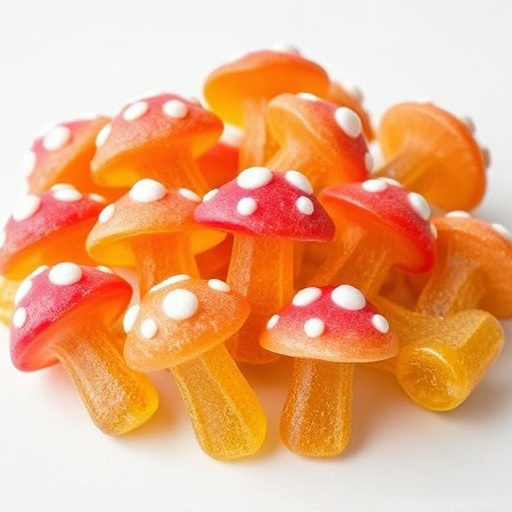
Magic Mushroom Gummies, rich in psilocybin from Psilocybe cubensis, offer a modern, precise way to e…….